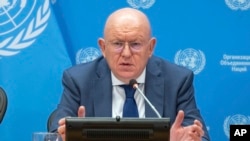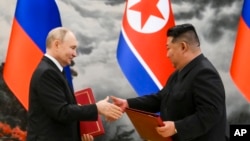The United States has flatly rejected Russia’s claim that it has not violated international sanctions imposed on North Korea, calling on Moscow to stop illegal arms transfers from Pyongyang.
“The U.S. and like-minded countries have successfully highlighted Russia’s U.N. Security Council Resolutions violations,” a State Department spokesperson said in an email to VOA’s Korean Service on Wednesday, responding to an inquiry made about Russia’s denial of violating North Korea sanctions.
“Unfortunately, we now have a permanent member of the U.N. Security Council willing to openly flout sanctions to support the Kim [Jong Un] regime’s priorities.”
The spokesperson continued: “We call on the DPRK and Russia to cease unlawful arms transfers and urge the DPRK to take concrete steps toward abandoning all nuclear weapons, ballistic missiles, and related programs.” DPRK stands for the Democratic People’s Republic of Korea, North Korea’s official name.
In a Monday press conference, Russian U.N. Ambassador Vassily Nebenzia insisted that his country had complied with international sanctions against North Korea.
“We’re not violating the North Korea sanctions regime and all those allegations that come out. They are not proved by material evidence,” he said.
The Russian ambassador went even further, questioning the integrity of a now-defunct U.N. panel of experts charged with monitoring North Korea sanctions. The panel’s annual mandate was not extended this year, following Russia’s veto at the U.N. Security Council in March.
Nebenzia alleged that the panel of experts got involved in the politics after being encouraged by certain countries, adding that "that was the major mistake that they made."
“The sanctions regime against DPRK is an unprecedented thing in the United Nations. It’s not time bound. It doesn’t have any provisions for reviewing, and this cannot be tolerated.”
The Kremlin’s refusal to renew the expert panel’s annual mandate marked a drastic change from its earlier support for U.N. Resolution 1718, which put in place an arms embargo on North Korea by banning all imports and exports of most weapons and related material.
The U.N. Security Council passed the resolution unanimously in October 2006, just several days after North Korea’s first nuclear test.
This week’s exchange between Washington and Moscow comes as Russia has been deepening military ties with North Korea.
Russian President Vladmir Putin and North Korean leader Kim Jong Un signed a comprehensive strategic partnership treaty during their summit in Pyongyang last month.
In recent months. the U.S. government has repeatedly blown the whistle on Russia’s alleged violations of international sanctions, accusing Moscow of financially and materially facilitating Pyongyang’s efforts to develop weapons of mass destruction.
In a May briefing, White House national security spokesperson John Kirby released specific figures of the refined oil Russia has provided to North Korea so far this year, stressing it has already exceeded the limit set by the U.N. Security Council.
“Russia has been shipping refined petroleum to the DPRK. Russian shipments have already pushed DPRK inputs above [those] mandated by the U.N. Security Council. In March alone, Russia shipped more than 165,000 barrels of refined petroleum to the DPRK,” Kirby said.
In October last year, the White House released three satellite images showing containers moved by ships and trains, saying North Korea had provided Russia with more than 1,000 containers of military equipment and ammunition.
Experts in Washington say this standoff between the U.S. and Russia over North Korea will likely persist for some time.
Scott Snyder, president of the Korea Economic Institute of America, told VOA’s Korean Service via email on Thursday that the recent defense pact between Moscow and Pyongyang is not something the U.S. can afford to ignore.
“North Korea will remain a source of conflict in U.S.-Russia relations as long as North Korea sustains their strategic relationship, which will continue at least until the end of military hostilities in Ukraine,” Snyder said.
Evans Revere, who formerly served as deputy assistant secretary of state for East Asian and Pacific Affairs, said in an email to VOA’s Korean Service on Friday that Russia is setting itself up as North Korea’s backer.
“Russia has made it clear that it intends to oppose U.N. Security Council sanctions, work with North Korea and others to find ways to get around current U.N. Security Council restrictions and strengthen its tactical and strategic coordination with North Korea,” Revere said.
“Russia, which was once part of the important coalition supporting the use of pressure and sanctions to deal with Pyongyang’s nuclear and missile programs, has now gone over to the other side and become Pyongyang's de facto protector.”
Jiha Ham contributed to this report.





